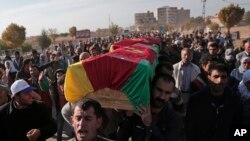Syrian activists said a month of U.S.-led airstrikes in Syria has killed 553 people, mostly militants from the Islamic State group and al-Qaida-linked Nusra Front.
The Britain-based Syrian Observatory for Human Rights said Thursday the deaths include 464 Islamic State fighters and 32 civilians.
The group, which has tracked the violence in Syria throughout the country's civil war, said it believes even more Islamic State militants have actually died but remain unreported because of difficulties in accessing some of the airstrike sites.
Also Thursday, Turkish President Tayyip Erdogan said a deal had been reached to send 200 Iraq Kurdish peshmerga fighters through Turkey to help defend the Syrian border town of Kobani against Islamic State militants.
Peshmerga to be deployed
A senior official in Iraq's Kurdistan region told Reuters the peshmerga would be equipped with heavier weapons than those being used by Kurdish fighters in Kobani, who say they need armor-piercing weapons to fend off Islamic State fighters.
Peshmerga spokesman Halgurd Hikmat told Reuters that preparations to deploy to Kobani were going on, but it would not happen on Thursday.
Erdogan spoke after Iraqi Kurdish lawmakers on Wednesday approved sending the fighters. The move marks the semi-autonomous region's first military foray into Syria's war.
Late Wednesday, Syrian Kurdish factions signed a deal to share power and set aside rivalries to capitalize on growing international support for their fight against Islamic State militants.
The agreement was reached after nine days of talks and coincided with a decision by Iraqi Kurdistan to send its own peshmerga forces to reinforce fellow Kurds in Kobani.
Kurds have taken advantage of more than three years of civil war in Syria to carve out their own zone of influence in the north of the country, but have been beset by internal rivalries.
Earlier this year, the dominant Democratic Union Party (PYD) established three “cantons” in northern Syria and declared self-rule, but other Kurdish parties rejected the move.
Wednesday's deal, which was signed in Iraqi Kurdistan under the auspices of the region's President Masoud Barzani, puts decision-making in the hands of a new body in which all parties will be represented.
Airstrikes
The U.S. is continuing its aerial bombardment against the Islamic State in Iraq and Syria, launching 15 new attacks.
The U.S. Central Command said Thursday it carried out nine strikes in Iraq in the last day, with four of them destroying insurgent operations near the Mosul dam and three others attacking militant positions south of Fallujah.
Meanwhile, the American military said it hit six targets in Syria, four of them near the restive town of Kobani, where the Islamic State and Kurdish fighters have been battling for weeks for control of the region just south of the Turkish border.
Huge plumes of black smoke from the Kobani explosions could be seen from across the border in Turkey.
Four air strikes by U.S. and allied forces in Iraq near the vital Mosul Dam hit small Islamic State units and destroyed a vehicle while another attack near Bayji took out a fighting position. Four strikes in the Fallujah area targeted a training facility, a larger Islamic State unit and a building.
Islamic State militants, keen to consolidate territorial gains in northern Syria, has pressed an offensive on Kobani even as U.S.-led forces continue bombing the militants' positions.
U.S. and partner nation planes have carried out more than 200 airstrikes in Syria since September 22, as part of an expanded effort to halt the Islamic State group.
At least 300 coalition airstrikes have also targeted the group in Iraq, where the militants swept through large areas of the northern and western part of the country in recent months.
Bundle of weapons goes to IS
Meanwhile, the Pentagon said a stray bundle of weapons and ammunitions that U.S. cargo planes intended to airdrop to Kurds in northern Syria did likely end up in the hands of Islamic State fighters.
Spokesman Steve Warren said Wednesday that 26 of 28 bundles dropped over Kobani were picked up by Kurds, but that two went astray. Warren said U.S. forces destroyed one, while the other was probably picked up by militants.
Video from a pro-Islamic State media group shows a masked fighter inspecting hand grenades, ammunition, and rocket-propelled grenade launchers as he voiced delight.
But Warren said the weapons are not enough to give the militants any type of advantage as they battle Kurdish defenders for control of Kobani.
On Thursday, the battle for strategic town of Kobani was raging on as gunshots rang out throughout the morning and echoed across to the Turkish side of the border.
Refugees in Turkey told VOA that residents in Kobani said there was heavy fighting overnight. The sound of heavy firing of mortars, RPGs (rocket-propelled grenades), possibly heavy machine guns and some lighter weapons also was heard around mid-day.
Correspondent Scott Bobb contributed to this report from Turkey. Some material for this report came from Reuters.





